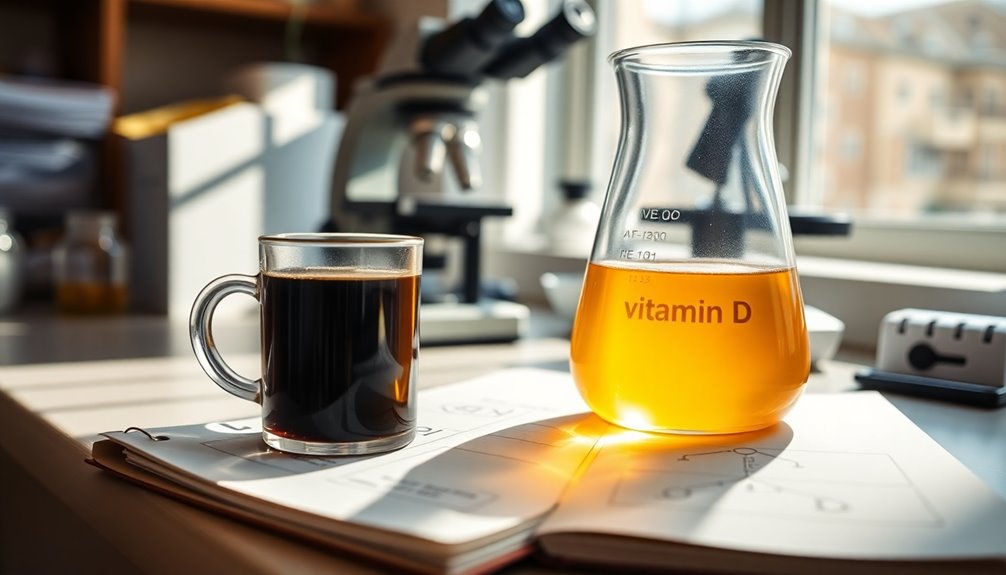Drinking coffee can affect your body's vitamin D absorption negatively. Caffeine decreases the absorption of this essential nutrient and lowers vitamin D receptor expression, which is important for bone health. Just one cup can impair calcium absorption and even increase urinary calcium excretion, further complicating your vitamin D levels. This is particularly concerning for those who consume high amounts of caffeine, as it raises osteoporosis risk over time. To maintain ideal vitamin D levels, consider timing your coffee consumption and boosting your vitamin D intake with fortified foods. Discovering more about balancing coffee with your health may prove beneficial.
Key Takeaways
- High caffeine intake can decrease vitamin D absorption and reduce vitamin D receptor expression, affecting bone health, especially in postmenopausal women.
- Caffeine inhibits calcium absorption and increases urinary calcium excretion, potentially leading to lower bone mineral density.
- Chronic caffeine consumption may impair iron absorption by up to 80%, further complicating nutrient balance.
- Studies show a correlation between higher caffeine levels and reduced serum 25(OH)D, indicating lower vitamin D status.
- To enhance vitamin D absorption, consume caffeine at least one hour before vitamin D-rich meals and consider vitamin D supplements if at risk.
Caffeine's Role in Nutrient Absorption

While you might enjoy your daily cup of coffee, it's important to recognize how caffeine can affect nutrient absorption, particularly vitamin D.
Research shows that high caffeine intake can decrease vitamin D absorption by lowering the expression of vitamin D receptors on osteoblasts, the cells responsible for bone formation. This interference may lead to reduced bone mineral density and increase the risk of osteoporosis.
If you consume significant amounts of caffeine, you might need additional vitamin D to counterbalance this effect. Monitoring your vitamin D levels becomes vital, especially if you're at risk for impaired calcium metabolism and related bone health issues.
Staying aware of your caffeine intake can help you maintain better overall nutrient absorption and support your bone health.
Vitamin D: Importance for Health

Vitamin D's vital for your bone health, helping your body absorb calcium and prevent conditions like osteoporosis.
It also boosts your immune system, enhancing your ability to ward off infections.
Plus, maintaining balanced hormone levels relies on adequate vitamin D, making it essential for overall well-being. Moreover, mammography aims to detect any potential health issues early, emphasizing the importance of overall health monitoring.
Role in Bone Health
Bone health relies heavily on your body's ability to absorb calcium, and vitamin D plays a crucial role in this process.
If you consume caffeine, it might impact your vitamin D absorption. Studies show that higher caffeine consumption can reduce the expression of vitamin D receptors, making it harder for your body to utilize this essential nutrient.
This interference can lead to decreased bone mineral density, particularly in postmenopausal women who face a higher osteoporosis risk.
With ideal vitamin D levels necessary for bone mineralization, caffeine's effect can increase fracture risks and compromise your overall bone health.
Immune System Functionality
Given its essential role in immune system functionality, maintaining adequate vitamin D levels is imperative for your overall health.
Vitamin D enhances the pathogen-fighting abilities of monocytes and macrophages, key players in your innate immune response. When your vitamin D levels are sufficient, you're less likely to experience respiratory infections and other illnesses.
Deficiency in this important nutrient can impair the production of antimicrobial peptides, making you more susceptible to infections. Furthermore, higher serum 25(OH)D levels are associated with better immune responses and lower rates of autoimmune diseases.
Hormonal Regulation and Balance
Maintaining proper hormonal regulation is essential for your overall health, and vitamin D plays a significant role in this process.
It's critical for calcium absorption, which directly impacts your bone health and helps maintain hormonal balance. When you have sufficient vitamin D, you lower your risk of deficiencies that can lead to conditions like osteoporosis and metabolic disorders.
The active form, calcitriol, interacts with hormones such as parathyroid hormone to guarantee calcium homeostasis. Without adequate vitamin D, you may face hormonal imbalances that contribute to autoimmune diseases and chronic inflammation.
Caffeine's Effects on Bone Health

While many enjoy their daily cup of coffee, it's important to contemplate how caffeine can impact bone health. Research shows that caffeine can inhibit vitamin D receptor expression on osteoblasts, essential for maintaining bone density. Higher caffeine intake is linked to reduced calcium metabolism, increasing your risk of osteoporosis, especially if you're a postmenopausal woman.
| Effect | Description |
|---|---|
| Vitamin D Receptors | 50% reduction in protein expression at 1 mM caffeine |
| Calcium Excretion | Caffeine's diuretic effect increases calcium loss |
| Bone Density | Chronic caffeine (300 mg/day) accelerates spine bone loss |
Being mindful of caffeine consumption can help you protect your bone health and optimize vitamin D absorption.
Mechanisms of Vitamin D Absorption

Vitamin D absorption primarily happens in your intestines, where dietary fats and specific proteins play an essential role in transporting the vitamin into your bloodstream. However, factors like caffeine can affect this process.
Here are some key points to take into account:
- Caffeine may reduce the expression of vitamin D receptors on osteoblasts, affecting bone health.
- Higher caffeine intake can correlate with decreased vitamin D absorption.
- The diuretic effect of caffeine increases urinary excretion of vitamin D, lowering its bioavailability.
- Ideal vitamin D levels are critical for calcium absorption, and caffeine interference can elevate the risk of osteoporosis.
Understanding these mechanisms is significant for maintaining your vitamin D levels, especially if you consume caffeine regularly.
Keeping an eye on your intake can help support your overall health.
Caffeine and Mineral Interference

You mightn’t realize that caffeine can interfere with your body’s ability to absorb essential minerals like calcium and iron. Moreover, excessive caffeine consumption can lead to a cascade of health issues, including anxiety and sleep disturbances, which can ultimately affect your overall well-being. Interestingly, some studies suggest that coffee’s impact on creativity isn’t straightforward; while moderate intake may enhance cognitive function, too much can hinder your ability to think critically and innovate. Balancing your caffeine consumption is key to both your physical health and mental clarity.
When you consume high amounts of caffeine, it can reduce calcium absorption and impair iron uptake, which are vital for your overall health.
Keeping an eye on your caffeine intake is key to ensuring you're getting the minerals your body needs.
Calcium Absorption Reduction
Caffeine's impact on calcium absorption can be significant, especially if you consume it regularly. Just one cup of coffee can slightly decrease calcium absorption rates, which is concerning for your bone health.
For postmenopausal women, the risks are even higher due to their increased likelihood of osteoporosis. Here's what you should know:
- Caffeine can lead to a loss of about 5 mg of calcium for every 150 mg consumed.
- High caffeine intake may increase urinary calcium excretion.
- Chronic consumption is linked to greater bone loss.
- Caffeine might reduce vitamin D receptor expression, further compromising calcium metabolism.
To maintain strong bones, consider timing your caffeine intake and adjusting your diet accordingly.
Iron Absorption Impairment
While enjoying your coffee, you mightn't realize that it can greatly impair iron absorption. Caffeine can reduce your body's ability to absorb iron by up to 80%, especially during meals.
For instance, consuming coffee with a hamburger may lower iron absorption by 39%, while bread could see reductions of 60-90%.
If you're at risk for iron deficiency, like during pregnancy or with certain health conditions, high caffeine consumption can worsen the situation.
To enhance iron absorption, it's wise to separate your caffeine intake from iron-rich meals by at least an hour. Pairing iron sources with vitamin C can also help counteract caffeine's negative effects, boosting your overall iron uptake. Additionally, optimal comfort can be achieved by managing dietary habits effectively to promote better nutrient absorption.
Strategies to Reduce Caffeine Impact

To minimize the impact of caffeine on vitamin D absorption, timing your coffee consumption can be vital. Here are some strategies you can implement:
- Enjoy your coffee at least one hour before meals to prevent interference with iron absorption.
- Increase your dietary intake of vitamin C and copper to boost iron absorption, supporting better vitamin D levels.
- Consider replacing caffeinated drinks with nutrient-rich foods like bananas, brown rice, and oatmeal for sustained energy.
- Switch to green tea for a gentler caffeine source that won't greatly impact vitamin D levels.
Additionally, staying hydrated is essential since hydration status influences nutrient absorption, including vitamin D, which caffeine can compromise due to its diuretic effects.
Healthier Alternatives to Coffee

If you're looking for healthier alternatives to coffee, consider nutrient-rich options like oatmeal or bananas that provide lasting energy without caffeine's drawbacks.
Herbal teas, such as green tea, can also offer a soothing boost without compromising your vitamin D absorption.
Exploring these choices can help you maintain your energy levels while supporting your overall health.
Nutrient-rich Food Options
Finding healthier alternatives to coffee can be a game-changer for your energy levels and overall well-being. By choosing nutrient-rich foods, you can enjoy a natural energy boost without the negative caffeine effects.
Here are some great options:
- Green tea: Offers a gentler energy boost with L-theanine, minimizing interference with vitamin D absorption.
- Dark chocolate: Packed with antioxidants, it provides energy and supports overall health without caffeine.
- Bananas: High in carbohydrates and potassium, they deliver quick energy while promoting muscle function.
- Oatmeal: Rich in B vitamins and iron, it supports energy production and enhances wellness without the drawbacks of coffee.
Incorporating herbal teas, like herbal tea for fibromyalgia, can also enhance overall well-being and comfort.
Opting for these whole grains and nutrient-rich foods can help you maintain your energy levels while supporting your health.
Herbal Tea Benefits
While many people rely on coffee for an energy boost, herbal teas offer a revitalizing and healthy alternative that can enhance your well-being. These caffeine-free options, like rooibos and chamomile, don't interfere with nutrient absorption, making them ideal for those concerned about vitamins and calcium levels. Additionally, herbal teas can provide adaptogenic properties that help reduce stress, contributing to overall health.
| Herbal Tea | Key Vitamins & Minerals | Health Benefits |
|---|---|---|
| Nettle | Iron, Calcium | Supports nutrient absorption |
| Dandelion | Vitamins A, C, K | Aids digestion |
| Peppermint | Vitamins B, C | Enhances digestive health |
The Science Behind Caffeine Consumption

Caffeine, a central nervous system stimulant, plays a significant role in your daily routine, often enhancing alertness and focus.
However, it's essential to understand how caffeine consumption can impact your health, particularly regarding vitamin D absorption and bone health. Here are some key points to take into account:
- Higher caffeine levels correlate with reduced vitamin D receptor expression on osteoblasts.
- Impaired vitamin D absorption may increase your risk of osteoporosis.
- Caffeine influences calcium metabolism, affecting bone mineral density.
- Chronic caffeine consumption can lead to lower vitamin D levels, which is worth monitoring.
Research Findings on Caffeine and Vitamins

Understanding how your caffeine intake affects vitamin absorption is vital for maintaining ideal health.
Research shows that higher caffeine levels can reduce vitamin D absorption, primarily due to decreased expression of vitamin D receptors in osteoblasts. This reduction poses risks for your bone health and mineralization.
Additionally, caffeine intake might impair calcium metabolism, further impacting your vitamin D status and bone mineral density.
Studies indicate that increased caffeine consumption correlates with lower serum 25(OH)D levels, a key marker for vitamin D. Over time, this can lead to significant reductions in vitamin D absorption and heighten the risk of osteoporosis, particularly for those with high caffeine habits.
Regularly monitoring your vitamin D levels is important if you're a coffee lover.
Recommendations for Coffee Drinkers

If you're a coffee lover, it's important to contemplate how your daily brew might be affecting your vitamin D absorption. Caffeine can interfere with vitamin D receptor expression, potentially reducing your vitamin D levels.
To help maintain your vitamin D status, consider these recommendations:
- Consume caffeine at least one hour before meals rich in vitamin D.
- Increase your intake of vitamin D-rich foods like fatty fish, eggs, and fortified products.
- Consider vitamin D supplements if your levels are low or you're at risk for deficiencies.
- Regularly monitor your vitamin D levels, especially if you're a habitual coffee drinker.
Implementing these strategies can help you enjoy your coffee while supporting your bone health and overall well-being.
Frequently Asked Questions
What Blocks Vitamin D Absorption?
Certain factors can block vitamin D absorption in your body. High caffeine intake, for instance, may inhibit vitamin D receptor expression, making it harder for your body to utilize this essential nutrient.
Additionally, low magnesium levels can impair vitamin D metabolism, while excessive alcohol consumption may disrupt the liver's ability to convert vitamin D into its active form.
Finally, certain medications, like steroids, can also hinder vitamin D's effectiveness. Keep these factors in mind to maintain ideal absorption.
How Long Can I Drink Coffee After Taking Vitamin D?
Did you know that over 60% of coffee drinkers might unknowingly impact their vitamin D levels?
If you've just taken vitamin D, it's best to wait at least one hour before sipping your coffee. This way, you allow your body to effectively absorb the vitamin without interference.
Keeping a gap between the two can help you maintain ideal vitamin D levels, ensuring your bones and overall health stay strong.
What Flushes Out Vitamin D?
If you're wondering what flushes out vitamin D, several factors come into play.
High caffeine intake can lead to increased urinary excretion of vitamin D, potentially depleting your levels.
Additionally, excessive alcohol consumption and certain medications can interfere with your body's ability to retain vitamin D.
Staying well-hydrated and maintaining a balanced diet can help mitigate these effects, ensuring your body absorbs and retains adequate vitamin D for peak health.
What Minerals Are Depleted by Caffeine?
Imagine you're enjoying your morning coffee, but did you know that caffeine can deplete important minerals?
Caffeine's notorious for reducing calcium absorption, leading to potential bone health issues. It can also decrease iron absorption by up to 80%, especially when consumed close to meals.
Over time, regular caffeine intake can result in lower magnesium, potassium, and zinc levels.
Conclusion
In the grand symphony of nutrition, coffee plays a complex note. While your morning brew might perk you up, it's wise to contemplate its potential impact on vitamin D absorption. Like a double-edged sword, caffeine can interfere with bone health and nutrient synergy. So, as you savor that aromatic cup, remember to balance it with healthier alternatives to guarantee your body thrives. After all, you want your health to dance in harmony, not miss a beat.










